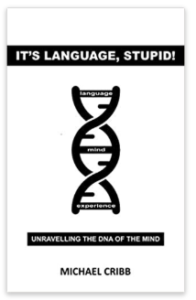Theresa May seems to have developed many ways of saying ‘no’ without actually meaning it. In her interview with Andrew Marr at the weekend, she frequently used reduced articulations of the word (e.g. ‘n-’) to preface her responses to Marr’s questions.
Politicians often use discourse markers to ‘disconnect’ their responses to questions from interviewers. Tony Blair often used ‘look-’ as a covert signal of change of tack when receiving a hostile question for an interviewer.
The Interview
Theresa May was interviewed by Andrew Marr on his show on Sunday ahead of an important debate and vote in the House of Commons on her Brexit deal. In the first four samples below, Marr (AM) repeatedly asked May (TM) whether she would bring the vote back to the commons if it was voted down the first time. Each time, May prefaced her turn with a sub-articulation of the word ‘no’. (You can listen to these by clicking on the link beneath.) This is typically followed by a brief pause (.) before continuing with her response.
Sample 1 AM: ... if MPs vote this down first time do you bring it back TM: n- (.) uh I’m working on getting this vote through parliament ... Sample 2 AM: ... employee in number ten is quoted as saying you could bring back this vote thirty time if necessary to get it through TM: no- (.) the the deal is on the table ... Sample 3 AM: ... I I take it you could bring it back then TM: we’re leaving on the twenty- no- (.) I want to see this deal go through ...
The advantage of articulating the word ‘no’ in a reduced way like this is that it produces ambiguity. While it appears to suggest that she will not bring back the vote repeatedly (confirming that she would might be seen as undemocratic) it does not preclude that she might (she may have to do this for strategic reasons).
Whereas for you and I, the word ‘no’ in face-to-face discourse is typically perceived as being a negative response to a question, in the Marr-May interview, it acts more like a discourse marker, denoting the speaker’s change of tack. Rather than ‘no’ meaning ‘no I will not do that’ it has the force of ‘no that is the wrong question, I want to talk about this’. In each answer, May ignores Marr’s direct question and instead returns to her idea that she has to get this vote through on the first vote.
Other markers
At other times, May uses other markers such as ‘well’ to prefix her turn or ‘yes’ in the case of sample 12 below where she wants to possibly respond positively to Marr’s question, although again the ‘yes’ is in a reduced form suggesting some ambiguity.
Sample 12 AM: ... are they going to be met in future TM: ye- (.) er (.) let me just sort of stand back and and say what we’re doing on ...
The many faces of ‘no’
The articulation of the word ‘no’ in May’s output is interesting. Almost 50% of her responses to Marr’s questions are prefixed with this marker. At times it is reduced and barely perceptible but at other times it is articulated in full as in sample 10 when she seems to clearly rule out asking for an extension to article 50.
Sample 10 AM: ... would you ask for an extension of article fifty so we could sort this mess out TM: no (.) this is about (.) look AM: no you wouldn’t TM: let’s be (.) uh (.) er the ...
This use of ‘no’ as a discourse markers contrasts starkly with another May interview I analysed shortly after the Grenfell tower disaster. Here, due to the sensitive nature of the subject the use of ‘no’ was inappropriate and May instead relied upon pauses.
BBC, The Andrew Marr Show. 6th January 2019
https://www.bbc.co.uk/iplayer/episode/b0by52nc/the-andrew-marr-show-06012019
All 16 samples are listed here:
Sample 1 AM: ... if MPs vote this down first time do you bring it back TM: n- (.) uh I’m working on getting this vote through parliament ... Sample 2 AM: ... employee in number ten is quoted as saying you could bring back this vote thirty time if necessary to get it through TM: no- (.) the the deal is on the table ... Sample 3 AM: ... I I take it you could bring it back then TM: we’re leaving on the twenty- no- (.) I want to see this deal go through ... Sample 4 AM: ... which leads me to assume that you would bring it back TM: n- AM: again and again and again TM: n- (.) uh Andrew (.) what I’m doing ... Sample 5 AM: ... that hasn’t happened that’s been a failure hasn’t it TM: no (.) the European Uni- ... Sample 6 AM: ... a spectrum of different outcomes it could be hardly more vague and waffly than that TM: n- AM: it’s almost meaningless TM: uh er (.) Andrew I’m sorry ... Sample 7 AM: ... forced to choose (.) which would you go for TM: no- (.) I’m going for my deal ... Sample 8 AM: ... if parliament did it would you actually implement it is my question TM: n- AM: you’re Prime Minister ... Sample 9 AM: ... surely as Prime Minister you have to do it TM: no- (.) the house of commons obviously will come to it’s view on these things at the moment ... Sample 10 AM: ... would you ask for an extension of article fifty so we could sort this mess out TM: no (.) this is about (.) look AM: no you wouldn’t TM: let’s be (.) uh (.) er the ... Sample 11 AM: ... you’re not quite answering my question TM: n- n- you are taking towards no deal TM: be- and ... Sample 12 AM: ... are they going to be met in future TM: ye- (.) er (.) let me just sort of stand back and and say what we’re doing on ... Sample 13 AM: ... why are you cutting funding for public health TM: n- (.) what we’re looking at ... Sample 14 AM: ... why are you cutting it TM: n- n- (.) let’s look at what (.) what I’ve just said Sample 15 AM: ... in something you said was about to collapse nearly two years ago TM: n- (.) there’s no doubt ... Sample 16 AM: ... er the universal credit rollout TM: no- (.) we’ve through the ...




Leave a Reply
You must be logged in to post a comment.